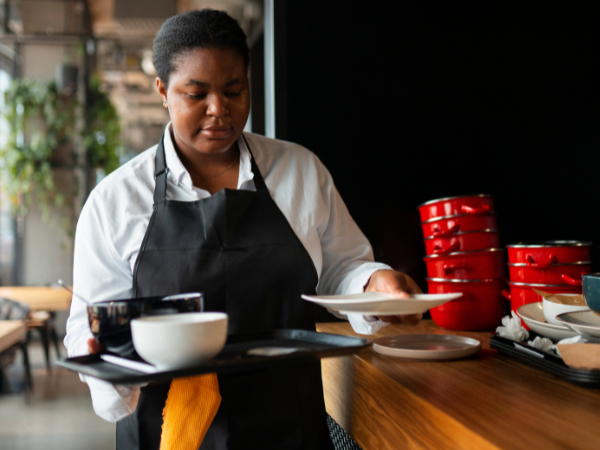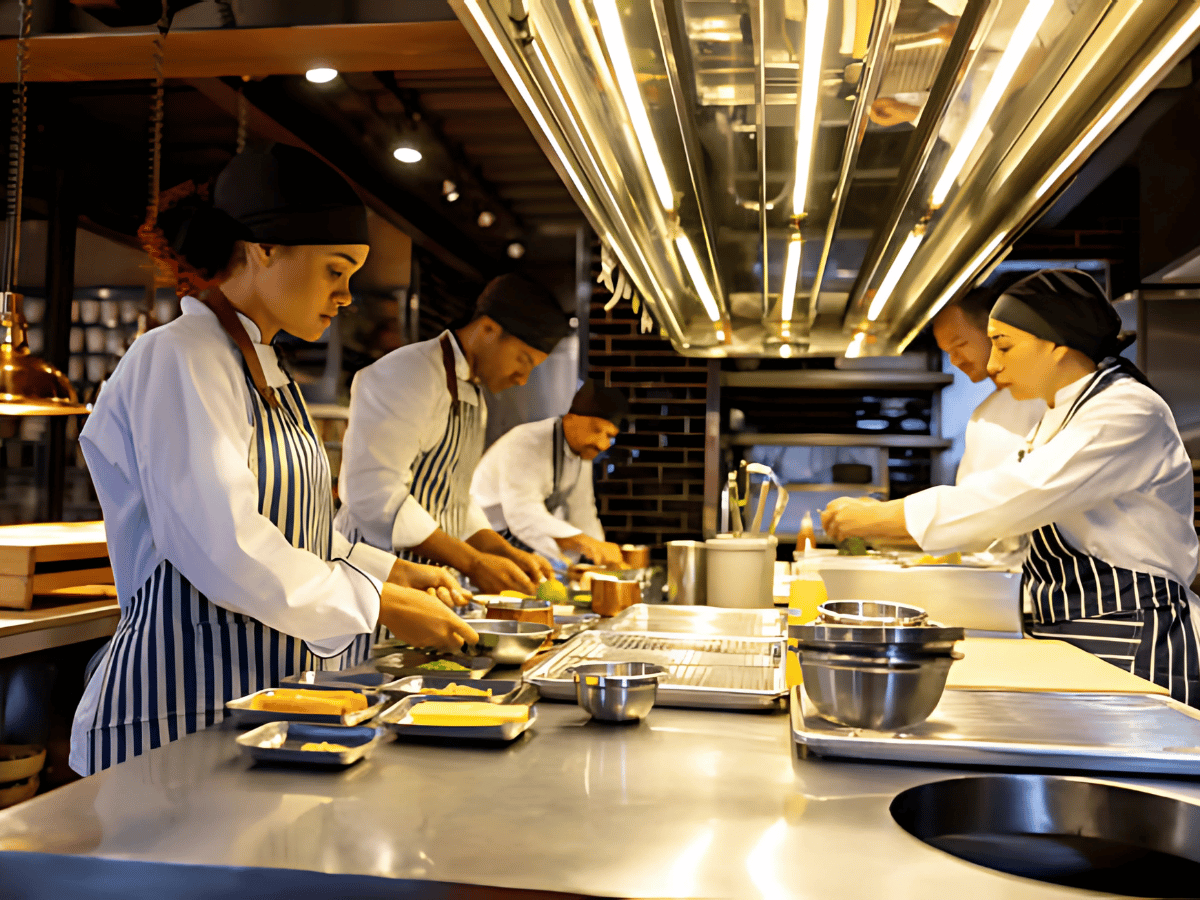In the heart of every restaurant lies its people. Yet across South Africa, the hospitality industry continues to rely on outdated and exploitative labor practices that not only harm workers but ultimately undermine profitability. High staff turnover, poor service quality, and failing businesses are not simply unfortunate side effects—they are symptoms of a system that prioritises short-term cost-cutting over long-term sustainability. Despite clear legislation under South Africa’s Basic Conditions of Employment Act, many restaurants regularly flout labor laws. The law limits working hours to 45 per week, with a maximum of 10 hours overtime and at least 12 hours of rest between shifts. Yet in kitchens across the country, it’s not uncommon for workers—particularly untrained or entry-level staff—to endure 12 to 16-hour shifts multiple times a week. Overtime is often unpaid, breaks are skipped, and rest periods are ignored. For workers who haven’t been formally trained but show potential, this environment quickly becomes toxic. These individuals, eager to work and learn, are instead thrown into chaotic systems with little support, no structured training, and inadequate compensation. They are set up to fail. Mistakes become common. Service standards slip. Tempers rise. And over time, many either walk out mid-shift, stop showing up entirely, or resort to theft as a desperate act of self-preservation. A 2023 survey of hospitality workers in Cape Town found that 82% cited long hours as a key reason for quitting, while 86% felt they were underpaid. The same report showed that when turnover occurs, remaining staff face increased pressure and reduced morale. Service quality declines, health issues rise, and new hires take longer to train due to the lack of proper onboarding systems. This isn’t just a human rights issue—it’s an economic one. Every resignation leads to recruitment costs, training time, and a drop in service consistency. In an industry where margins are already razor-thin, these disruptions are financially devastating. Restaurants that develop reputations for exploiting staff also struggle to attract skilled professionals or customers who value ethical business practices. The psychological toll of exploitation is equally damaging. Chronic fatigue, anxiety, and burnout reduce not only productivity but also decision-making ability and team cohesion. Workers begin to emotionally detach from their jobs, and when that happens, pride in workmanship disappears. An employee who feels disrespected and dispensable will never go the extra mile. Instead, they will do the bare minimum—if they show up at all. The solution is not radical; it’s responsible. Fair pay, adequate staffing, legal shift scheduling, and proper training must become standard, not optional. Employers who invest in their teams see the rewards: lower turnover, improved service, loyal customers, and a healthier bottom line. A well-rested, fairly paid, and properly trained employee is more productive, more engaged, and more likely to stay. That stability is priceless in an industry built on consistency and guest satisfaction. In short, when restaurants exploit their workers, they exploit their own potential. It is time for the industry to acknowledge that treating workers fairly isn’t just morally right—it’s financially smart. Sustainable hospitality starts with sustainable employment. The message is crystal clear: Treat staff with dignity and invest in their well‑being—and your bottom line will reflect it.
The Hidden Backbone of South African Hospitality: Why It’s Time for Change
South Africa’s hospitality industry stands at a pivotal juncture. For decades, it has been a beacon of opportunity for many, especially those from underprivileged backgrounds seeking a foothold in the formal economy. Yet, beneath the surface lies a tapestry of challenges that, if addressed, could unlock immense socio-economic potential. South Africa grapples with one of the highest unemployment rates globally. As of early 2025, the overall unemployment rate stood at 31.9%, with youth unemployment alarmingly high at 61% for those aged 15 to 24 . Even graduates are not immune; the graduate unemployment rate increased from 8.7% in 2023 to 11.7% in 2024 .In this landscape, the hospitality sector has emerged as a vital employer. Tourism, a significant component of hospitality, contributes approximately 3.3% to the country’s GDP and supports 10.3% of employment . Cape Town exemplifies both the challenges and opportunities within the hospitality sector. The city accounts for approximately 73% of the Western Cape’s GDP and has been recognized as Africa’s leading tourist destination . Tourism in the Western Cape contributes 9.8% to the province’s GDP and employs 9.6% of its workforce. Despite this, many hospitality workers in Cape Town come from underprivileged backgrounds, often residing in townships and informal settlements with limited access to basic services . The hospitality industry has long been a refuge for those lacking formal education or opportunities in other sectors. Many individuals from disadvantaged communities find employment as waitstaff, cleaners, or kitchen assistants, roles that, while essential, often come with low wages and limited prospects for advancement. Yet, the dedication and resilience of these workers are undeniable. They are the face of South African hospitality, ensuring that tourists receive world-class service despite the challenges they face. Investing in the training and development of hospitality workers is not just a moral imperative; it’s an economic one. Enhancing skills and providing clear career pathways can lead to increased job satisfaction, lower turnover rates, and improved service quality. Moreover, such investments can have a ripple effect, uplifting entire communities and contributing to broader economic growth. At HirePro, we recognize the untapped potential within South Africa’s hospitality workforce. Our mission is to bridge the gap between talent and opportunity by: Providing Comprehensive Training: Equipping workers with the skills needed to excel and advance in their careers, including free access to internationally accredited courses. Ensuring Fair Compensation: Advocating for wages that reflect the value and importance of hospitality roles. Creating Career Pathways: Offering clear routes for progression, from entry-level positions to management roles. We believe that by investing in people, we invest in the future of South Africa’s hospitality industry. It’s time to recognize and uplift the individuals who are the heart of this sector. The people behind the plate, the bar, the table — they are not just workers. They are the hidden backbone of an industry that keeps South Africa’s economy and tourism alive. At HirePro, we’re not waiting for change — we’re building it. Whether you’re a venue looking for reliable staff or a professional ready to grow your career, you’re part of this movement. Let’s honour the hands that serve, clean, cook, and carry the weight of South African hospitality.
Why South Africa’s Hospitality Industry Desperately Needs Accessible Training
Let’s get right to it. The South African hospitality industry is bleeding talent through the cracks of a system that forgot to train the very people that make it work. An astonishing 85% of our hospitality workforce is untrained. Let that number sink in. That means if you’re walking into a restaurant, a hotel, or even a boutique guesthouse, the person greeting you likely never had a formal introduction to service standards, customer care, or even safety protocols. Now stir this into the pot: 54% of that workforce also battles with poor literacy skills. We’re not just talking about struggling with the Queen’s English here. We’re talking about not being able to properly read a training manual, a kitchen docket, or a guest request. This isn’t a staff problem. It’s a system failure. And here’s the kicker: even the world-class, multimillion-rand international hotel groups operating in South Africa are drawing from this very same talent pool. You could step into a luxury 5-star property with high-thread-count sheets and imported marble floors, only to be served by someone who’s been given less training than a barista at a fast food drive-through. What’s the cost of that? Subtle, but powerful: Service feels inconsistent. Standards feel… negotiable. The luxury experience never quite lands like it should. Untrained Workers = Unhappy Workers = Toxic Workplaces Here’s where things get messy. Without training, staff feel lost. Without understanding the “why” behind the work, mistakes are made. Mistakes lead to blame. Blame leads to tension. Tension? Well, that breeds toxicity. Soon, you’ve got an entire segment of the workforce burnt out, disillusioned, and bouncing from job to job. It’s not laziness. It’s survival. And it’s creating an industry loop: underpaid, untrained workers delivering half-hearted service in environments where no one wins. Enter: Accessible Training Now, we’re not talking about locking folks in classrooms and throwing textbooks at them. We’re talking real-world, bite-sized, mobile-accessible, affordable training. Hospitality bootcamps. On-the-job digital modules. Real mentorship. Training that’s: Designed in plain language. Taught by pros who’ve been there. Accessible from any phone. Focused on practical, instantly-usable skills. This isn’t just nice to have. It’s essential. Because that 85%? They’re not a problem. They’re the solution. They’re passionate, hardworking people. They want to grow. They want to deliver. They just need the tools. African Hospitality Is Already Magic Here’s our trump card: South African hospitality is naturally warm, welcoming, and personal. It’s why tourists remember their waiter’s name. It’s why locals return to the same neighborhood spot for decades. We don’t need to invent charm. We already have it. But imagine what happens when we add skill to that charm. When we teach a sculler why hygiene practices matter. When we show a waiter how to upsell without pressure. When we empower a bartender to lead with both flair and finesse. We create an industry that’s not just warm. It’s world-class. HirePro is Building That Future At HirePro, we believe in empowering the people behind the plate. Our platform gives workers access to internationally recognized training programs, mental health support, and fair job opportunities—because we know you can’t build a five-star experience without five-star humans. We’re not here to slap a bandage on a broken system. We’re here to rebuild it—with skill, compassion, and a whole lot of heart. The future of South African hospitality is local, proudly skilled, and undeniably brilliant. And it starts with training. “Training isn’t something you do once and forget. It’s how you grow an industry that thrives.”
The 5 Beliefs behind HiroPro Platform
Behind every shift, there’s a story. Behind every platform, there’s a purpose. At HirePro, we’re not just matching workers to jobs — we’re rebuilding trust in an industry that’s too often driven by burnout, favouritism, and short-term fixes. Hospitality is tough. It moves fast, breaks often, and relies on people showing up — not just physically, but with heart. And too many of those people feel unseen. That’s why we built HirePro — not as another agency, but as a people-first platform. One that puts respect, fairness, and opportunity at the centre of every connection. These are the five beliefs that guide us: 1. People Over Profit We don’t charge workers to join. Ever.We don’t take commission from their pay. Instead, we run a flat, transparent subscription model for businesses — because we believe if you treat people well, everyone wins. This isn’t just a business model. It’s a values model. 2. Real Work Deserves Real Respect We’ve heard it too many times:“I’m just a waiter.”“I only do scullery work.” At HirePro, there’s no such thing as “just.”Every shift matters. Every role counts.Chefs, baristas, bartenders, waiters, scullers — every person who keeps a venue running deserves to be seen, supported, and treated with dignity. 3. Fairness Over Favouritism We’re not interested in who knows who.Every candidate on HirePro goes through the same vetting process — video intros, assessments, or trial shifts. Every employer sees the same profiles. Transparent. Honest. Consistent. We don’t do backroom deals. We do equal opportunity. 4. Built by the Industry, for the Industry This platform wasn’t built in a boardroom.It was built after years in kitchens, on event floors, and behind service counters. Co-founder Daniel Nel is a classically trained chef who’s worked in world-class restaurants. Samantha Nel brings deep insight into people, wellness, and what it means to build a team culture that actually works. Together, they’ve been on both sides — managing venues and working shifts. That’s why HirePro gets it. 5. Flexibility Without Exploitation We believe in freedom — to work when and where it suits you. But flexibility can’t come at the cost of professionalism. HirePro is about balance: Shifts that fit your life Standards that protect the industry Reliability that venues can count on Flexible doesn’t mean flaky. And fair doesn’t mean slow. Why These Beliefs Matter Because the old system isn’t working.Because the people who carry this industry deserve better.Because no one builds a thriving venue without trustworthy people behind it. HirePro isn’t just a tool. It’s a mindset shift. One that’s already helping businesses fill gaps with confidence — and helping workers find pride in what they do again. It’s not perfect. But it’s real. And it’s growing.
Why Hospitality Hiring Needs a Human Touch
The hospitality industry is built on people — their energy, their passion, their ability to turn an ordinary night out into something unforgettable. But when it comes to hiring, people are often treated like numbers. Staff are shuffled around with little care, venues are sent whoever’s available, and quality suffers. At HirePro, we believe it’s time for something better. We’ve been in the trenches — working 15-hour kitchen shifts, chasing no-show staff, dealing with burnout and broken promises. We know what it feels like when the system isn’t built to support you. That’s why we created a platform that flips the script. People First, Always HirePro isn’t an agency. We’re a people-first platform designed to connect quality staff with trusted businesses and venues — fairly, quickly, and transparently. Here’s how we do it differently: Real Vetting: Every HirePro crew member is assessed through trials or tests. No shortcuts. Fast Matches: Venues can find staff in real time, without the markup or mystery. Human Support: Our team is here — not bots, not bureaucracy — to help both sides thrive. Built by Industry Insiders Our founders, Daniel and Samantha, have lived this. Daniel’s a chef who knows the stress of short-staffed shifts. Samantha’s a mental health advocate passionate about fairness at work. Together, they built HirePro to restore dignity to an industry that’s long overdue for change. Because Great Hospitality Starts With Great Humans If you’re tired of being treated like a cog in the machine — whether you’re hiring or hustling — HirePro is for you. Explore the platform. Join the network. Let’s fix hospitality, together.
How to Land More Shifts as a Hospitality Freelancer
Freelancing in the hospitality industry gives you flexibility and variety. But if you want consistent work and better opportunities, you need to take the right steps to stand out. Shifts don’t just fall into your lap—you have to earn them. Here’s how to get noticed, build a strong reputation, and stay booked. 1. Be Punctual—Every Time Showing up on time is non-negotiable. Being late—even once—hurts your chances of being booked again. Aim to arrive 10 to 15 minutes early. It gives you time to settle in, review any briefing notes, and show that you’re serious. Agencies and clients remember freelancers who are reliable. 2. Stay Ready for Last-Minute Shifts Sometimes businesses need urgent help. If you’re flexible and available at short notice, you’ll often get the call. Keep your phone close, respond quickly to shift offers, and update your availability often. The more available you are, the more trust you build with coordinators. 3. Dress Neatly and Stay Presentable Even if the shift is short or the role is behind the scenes, your appearance matters. Always wear the correct uniform or dress code. Be clean, tidy, and well-groomed. Bring any required items (like non-slip shoes, aprons, or ID) so you’re never caught unprepared. You’re not just representing yourself—you’re representing the staffing agency and the client’s brand. 4. Follow Instructions and Ask When You’re Not Sure Every shift is different. Some venues will have specific procedures or service styles. Always listen carefully to the briefing and don’t hesitate to ask questions. It’s better to check than to assume. Clients remember freelancers who listen, follow through, and don’t need to be told twice. 5. Stay Positive and Professional Attitude matters just as much as skill. Stay polite, calm, and friendly—even if it’s busy or stressful. Treat guests and team members with respect. Don’t get involved in complaints or gossip, and never argue with supervisors on shift. A good attitude is what gets you recommended for more work. 6. Learn and Improve with Every Job Take notes after each shift. What went well? What could have gone better? Were there skills you were missing? Use that feedback to grow. The more you learn, the more confident you become—and the more valuable you are to clients. If you’re new to the industry, consider asking for short training or shadowing opportunities. 7. Communicate Clearly Respond to calls, messages, and shift offers quickly. If you can’t make a shift, let the team know early. Don’t go quiet or ghost a booking. Clear, honest communication builds long-term trust—and that means more consistent work. 8. Ask for Feedback—and Use It After each shift, ask your coordinator or supervisor for honest feedback. It shows that you care about doing a good job and want to improve. If they give you areas to work on, take them seriously. It will make you stronger over time. 9. Keep a Clean Record No-shows, last-minute cancellations, or poor conduct don’t go unnoticed. One bad experience can cost you future shifts. Always show up, give your best effort, and let your agency know if anything changes. Freelancers who build a reputation for being dependable are the ones who stay busy. 10. Build Relationships with Agencies and Coordinators Agencies remember the names of people they can count on. Be polite, stay in touch, and keep your availability updated. Send a short message now and then to let them know you’re keen for more work. Small gestures go a long way. The More You Show Up, the More Work You’ll Get Freelancing in hospitality rewards consistency, reliability, and effort. If you treat each shift like a chance to prove yourself, the results will follow. Agencies want freelancers they can count on—and clients want staff who care. Want to get booked for more hospitality shifts? 👉 Register with us today or update your profile to let us know you’re available.
Hospitality Hiring Tips for the Cape Town International Jazz Festival
The Cape Town International Jazz Festival is one of the biggest annual events in South Africa’s entertainment calendar. Thousands of guests from around the world descend on the city, filling up hotels, restaurants, bars, and event venues. For hospitality businesses, this is a high-pressure opportunity to deliver great service—and hiring the right staff is critical. Here’s how to prepare your team for festival season and make the most of this high-traffic period. Start Your Hiring Process Early Last-minute hiring leads to rushed training and gaps in service. Start your planning early. Forecast your staffing needs based on previous years and expected foot traffic. Confirm any existing team members who’ll be available, and identify where you’ll need extra support. Connect with a staffing partner early to secure experienced temporary staff. The closer you get to the event, the more limited your options become. Prioritise Experience and Reliability Not every shift during the Jazz Festival will be easy. Your team will face high volumes, tight timelines, and demanding guests. This is not the time for untested staff. Prioritise candidates who’ve worked similar events before—especially those with experience in high-volume food service, bar work, or guest management. Ask your staffing provider for references or performance feedback. It’s better to pay a bit more for staff who can deliver under pressure. Staff for the Peaks Identify your busiest times—before and after shows, lunchtime rushes, late-night service—and make sure you’re well staffed during those windows. Don’t spread your team thin across the whole day. Focus on coverage where it matters most. Use flexible shift schedules so staff are fresh and alert during peak periods. Avoid burnout by rotating roles and giving breaks during quieter moments. Assign Clear Roles and Responsibilities When service ramps up, confusion causes delays. Make sure every team member knows exactly what they’re responsible for. Define roles at the start of each shift. If you’re using temporary staff, pair them with permanent team members who know your venue and workflow. Having a clear structure keeps operations smooth and professional. Provide a Quick Onboarding Guide You may not have time to give full training before the event, but a short onboarding pack can go a long way. Include key details like: Venue layout Service standards Health and safety protocols Emergency contacts Dress code and shift times Send this in advance and go over it at the start of each shift. Clear communication reduces errors and helps temporary staff settle in quickly. Ensure Staff Look the Part Presentation matters. Make sure all team members are dressed appropriately and meet your business’s hygiene and uniform standards. If you’re using agency staff, brief them on the expected look and provide uniforms if needed. The Jazz Festival draws international attention—how your team presents reflects on your brand. Focus on Attitude, Not Just Skills Skills can be taught. A positive attitude, however, is hard to fake. Look for staff who are punctual, polite, proactive, and calm under pressure. A great attitude can help resolve problems, keep customers happy, and maintain team morale during long shifts. Ask your staffing partner to recommend individuals who’ve shown these traits on previous jobs. Prepare for the Unexpected During major events, things can change quickly—sudden walk-ins, technical issues, or staff no-shows. Make sure you have backup staff on call and someone available to coordinate on-site issues. Flexible staffing gives you the ability to respond fast. Having contingency plans makes you more resilient and keeps the customer experience intact. Collect Feedback After the Event After the Jazz Festival, do a quick review of your staffing experience. What went well? Where were the gaps? Which team members stood out? Use this information to refine your hiring process for the next major event. Ask your staffing partner for performance feedback and flag top performers for future jobs. Get the Right People in Place Events like the Cape Town International Jazz Festival create huge opportunities for food and hospitality businesses. But your success depends on the strength of your team. Plan early, hire smart, and make use of flexible staffing to stay ahead. If you need trained staff for the Jazz Festival, we’re ready to help. We provide experienced hospitality professionals who are reliable, fast on their feet, and ready to hit the ground running. Whether you need waiters, bar staff, kitchen hands, or front-of-house support, we’ve got you covered.
Is Flexible Staffing the Future of Food & Hospitality
The food and hospitality industry has always moved fast. It’s driven by demand, shaped by seasons, and constantly adapting to events and economic shifts. Today, businesses face an even more dynamic environment—rising costs, labour shortages, fluctuating foot traffic, and unpredictable external factors. Traditional staffing models no longer meet the needs of hospitality businesses. Flexible staffing does. You need to respond to customer flow in real time. Whether you’re running a hotel, restaurant, catering company, or food truck, your staffing model must be agile. Flexible staffing isn’t a trend—it’s a practical solution to real problems. It gives you the ability to scale up or down without being locked into fixed overheads. It also helps you access specialised talent when you need it, without the costs of permanent employment. Let’s look at why flexible staffing is becoming essential in food and hospitality, and what it means for your business. You Can Match Staff Levels to Demand In hospitality, demand is rarely constant. There are high and low seasons, weekdays and weekends, lunch rushes and quiet afternoons. Events and weather can change everything overnight. With a traditional full-time staff, you either have too many people during slow periods or not enough during busy times. Flexible staffing gives you control. You only bring in people when the business needs it. You keep your core team consistent and reliable, but you supplement it with trusted temporary staff who can step in when things get busy. This reduces unnecessary labour costs and improves efficiency. You’re not paying for idle time, and you’re not leaving customers waiting when things get busy. You stay lean but responsive. You Reduce Labour Risk and Overheads Hiring full-time staff means committing to salaries, leave benefits, and long-term costs—even if business slows down. In a volatile environment, that puts pressure on your bottom line. Restaurants close suddenly. Events get cancelled. Load shedding interrupts service. Flexible staffing reduces this risk. You don’t carry permanent overheads for unpredictable work. You avoid paying staff you can’t use during slow periods or service disruptions. Instead, you call on support when you need it—whether that’s for a night, a weekend, or an entire season. This lowers financial risk and makes your business more resilient. You Access Trained Talent, Fast Speed matters in hospitality. Sometimes you need a qualified barista tomorrow, or an experienced waiter for an event on short notice. Recruiting, screening, and training someone in-house takes time and resources. You may not have either. With a flexible staffing partner, you can access trained talent immediately. You get people who know the job, can slot into your operation, and don’t need weeks of onboarding. That keeps your service running smoothly, even in unpredictable conditions. This is especially useful when a staff member calls in sick or resigns unexpectedly. You stay operational without disruption. You Can Focus on Core Business Hospitality owners and managers often wear too many hats. Recruiting and scheduling staff can take hours of time every week. Managing contracts, checking shifts, and handling no-shows drains focus away from quality control, customer service, and profitability. Outsourcing some or all of your staffing frees you up to manage what matters most. A good staffing partner will handle recruitment, vetting, placements, timekeeping, and even payroll. You maintain oversight without taking on every task. You get time back to grow the business, build the brand, and train your core team. You Create a Scalable Model for Growth Growth in hospitality doesn’t always happen in a straight line. You might open a second location, take on a large event, or land a big contract. But without enough staff, you can’t say yes to new opportunities. Flexible staffing removes that bottleneck. You get the people you need to scale up when it counts. You don’t have to delay plans while you hire. You don’t overextend your existing team. You keep service levels steady and protect your reputation while growing. It also helps when you downscale. If a venue underperforms or a market changes, you can adjust without retrenchments or long-term losses. You Build a More Diverse and Adaptive Workforce Traditional employment models favour full-time generalists. But modern hospitality needs specialists. A top chef for one event. A bar team with cocktail experience. A waiter who understands fine dining. Flexible staffing helps you access people with the right skills for the right task. This improves service delivery and customer experience. Your team becomes more dynamic, with better alignment to your offering. You also benefit from a more diverse range of experience, which can help your internal staff learn and improve. At the same time, flexible workers value the freedom and opportunity. Many bring fresh energy, a positive attitude, and pride in their work. This contributes to a more engaged workforce overall. You Respond Better to Local Conditions Cape Town’s hospitality sector is unique. It’s shaped by seasons, tourism cycles, school holidays, international events, and load shedding. A rigid staffing structure doesn’t serve local realities. You need to respond with agility. During the peak summer season, restaurants and hotels need large, fast-moving teams. During winter, many businesses scale back. Events like the Cape Town Cycle Tour or Jazz Festival change demand overnight. Flexible staffing matches your workforce to the environment. You stay prepared without taking unnecessary financial risks. This improves long-term sustainability. You Stay Compliant Without the Admin Employment law is complex. Labour disputes, compliance risks, and misclassified workers create legal exposure for hospitality businesses. If you get the paperwork wrong, it could cost you more than just money. A reliable staffing partner helps you stay compliant. They handle contracts, time records, tax, UIF, COIDA, and all required documentation. You reduce your legal risk while maintaining control of the staffing process. You also improve your brand reputation by ensuring fair treatment and transparency with temporary workers. You Gain Data and Visibility on Workforce Costs Flexible staffing platforms give you access to workforce data. You can see who worked, when, for how long, and at what cost. You understand labour productivity and trends.








